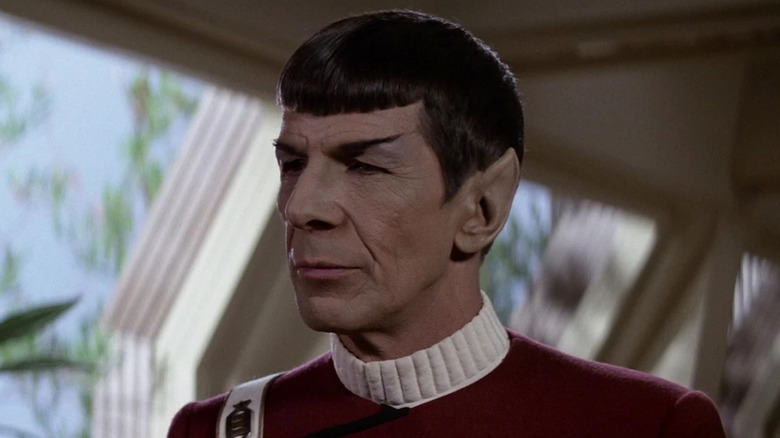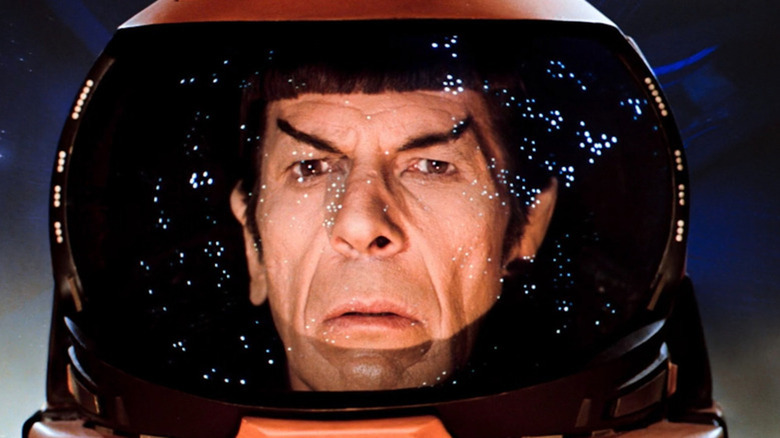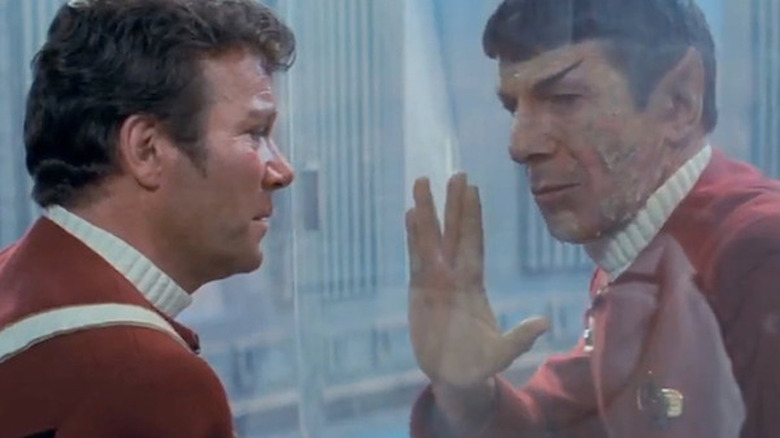Why Leonard Nimoy Nearly Refused To Play Spock In Star Trek II: The Wrath Of Khan
The "Star Trek" movie franchise was almost a one-and-done fiasco. Paramount had the highest of hopes when they released "Star Trek: The Motion Picture" on December 7, 1979, and, at first, it appeared as though their commercial expectations would be exceeded. The film scored the biggest opening of the year with a gross of $11.9 million (slightly better than the openings for "Alien" and "Moonraker"), but mixed reviews and ho-hum word of mouth (particularly from non-fans) kept it from being the runaway blockbuster it needed to be given its then exorbitant $44 million budget. It wound up being the fourth highest grossing film of 1979 behind "Kramer vs. Kramer," "The Amityville Horror" and "Rocky II").
The film's primary problem was its length and lack of action. At 132 minutes, Robert Wise's movie kind of lumbered; there are long, reverent shots of the U.S.S. Enterprise that, for many in the audience, quickly went from awe-inspiring to tedious. Viewers who were clamoring for the gee-whiz vitality of George Lucas' "Star Wars" felt bored, and lost interest in a plot that valued smarts over space-bound dogfights (though it does have its ardent defenders).
Still, "Star Trek: The Motion Picture" was successful enough to merit a sequel, albeit one that would be made on a far more sensible budget. But as the producers began developing the project, a massive problem emerged: Leonard Nimoy wanted no part of it.
Leonard, how would you like to play your death scene?
William Shatner might've been the top-billed star of "Star Trek" since the television series premiered in 1966, but Nimoy's half-human, half-Vulcan Spock was by far the fan favorite. The character's logical, stoic demeanor was the perfect complement to Captain James T. Kirk's brash, sometimes hot-headed leadership. Nimoy loved the character and wanted to be a part of "Star Trek" going forward; he just didn't want to foist substandard installments on the franchise's fiercely loyal fanbase.
As Nimoy remarked in Edward Gross and Mark A. Altman's "The Fifty Year Mission: The Complete, Uncensored, Unauthorized Oral History of Star Trek: The First 25 Years," "[At the time] I really was adamant that I would not work on 'Star Trek II' because I had been so frustrated with the other and I was feeling very negative about the whole thing."
This was disastrous news for producer Harve Bennett and screenwriter Jack B. Sowards. A "Star Trek" movie completely devoid of Spock would definitely upset the fans. So Sowards told Bennett to phone Nimoy and throw an improvised hail mary that would hopefully change the actor's mind. They were desperate and willing to make huge concessions to secure Nimoy's involvement. As Soward recalled in Gross and Altman's book:
"[Bennett] picked up the phone, dialed the number, and said, 'What do I say?' I said, 'You say, 'Leonard, how would you like to play your death scene?'" And Leonard's comeback was, 'Where does it come in the picture?' Harve looked at me and said, 'Where does it come in the picture?' And I said, 'Right up front. Right in the very beginning.' A minute or two later Harve hung up and said, 'Leonard will do it.'"
It got to be a messy situation
For his part, Nimoy remembered this negotiation as incredibly fraught. Per Gross and Altman's tome:
"[Harve] caught me completely by surprise with that one. The more I thought about it, the more I thought, 'Well, maybe that's the honest thing to do. Finish it properly rather than turn your back on it.' So, eventually, we agreed Spock would die. There was a lot of controversy over whose idea it was and why. It was even said that it was the only way I would do it and that it was in my contract that Spock would die! It got to be a messy situation."
Obviously, the timing of Spock's death changed throughout the writing process. According to Sowards, they kept moving his demise to later in the film until, finally, they placed it at the end where I think we all can agree it belonged. If you can remain stone-faced when a dying Spock tells Kirk, "I have been, and always shall be, your friend," your lack of emotion isn't Vulcan-like, it's downright monstrous.
In any event, "Star Trek II: The Wrath of Khan" was far more profitable for Paramount than the first film. It absolutely saved the franchise, spawning numerous sequels, new series and a rebooted big-screen iteration from J.J. Abrams (which has stalled). It remains the crown jewel of "Star Trek" movies, and, for my money, is one of the most rewatchable films ever made. Killing Spock was a risky proposition, but it was handled with admirable sensibility by director Nicholas Meyer.


